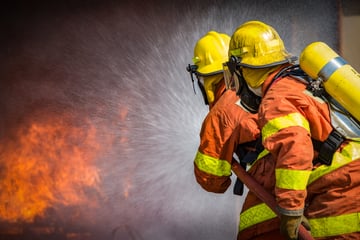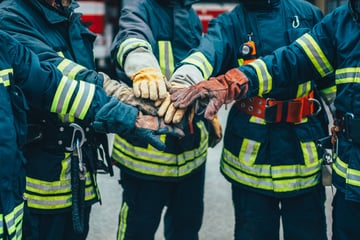How Neighbors Can Keep Each Other Safe This Thanksgiving
Thanksgiving is more than just a day to gather with loved ones and share a meal—it's also one of the most fire-prone days of the year. An estimated 1,446 home cooking fires were reported to U.S. fire departments on Thanksgiving Day in 2023, reflecting a 388 percent increase over the daily average, according to the National Fire Protection Association (NFPA). But here's the good news: most of these fires are preventable, and as neighbors, we can look out for one another to ensure everyone has a safe and happy holiday.
The Reality of Thanksgiving Fire Risk
The statistics are sobering. A 2025 analysis from Safehome.org shows that Thanksgiving Day sees a 240% increase in residential cooking fires over any other day of the year. Christmas Day and Christmas Eve follow as the second and third most fire-prone days. What makes Thanksgiving particularly dangerous? Multiple dishes cooking and baking at the same time, along with guests, entertaining, and other distractions, create the perfect storm for kitchen mishaps.
The leading culprit? Unattended cooking. In the rush to greet guests, set the table, or watch the game, it's all too easy to lose track of what's simmering on the stove or roasting in the oven. Cooking causes half (53%) of all reported home fires, nearly two of every five (38%) home fire injuries, and is a leading cause of home fire deaths (18%).
Kitchen Safety: Your First Line of Defense
Preventing fires starts with staying vigilant in the kitchen. Here are essential safety practices every home cook should follow:
Stay present and alert. Never leave cooking food unattended, especially when frying, sautéing, or using high heat. If you must step away, turn off the burner. When roasting the turkey or baking dishes that require longer cooking times, stay home and check on them frequently. Set a timer as a reminder—your phone works perfectly for this.
Create a kid-free zone. Establish a three-foot "safety zone" around the stove and oven where children and pets are not allowed. Hot oil splashes, steam burns, and accidental spills can cause serious injuries to curious little ones.
Clear the clutter. Keep dish towels, oven mitts, wooden utensils, food packaging, and anything else that can burn away from the stovetop. Loose sleeves are also a hazard—consider wearing short or tight-fitting sleeves while cooking.
Know your turkey fryer risks. If you're deep-frying a turkey, the NFPA strongly discourages using oil-powered fryers due to the significant fire and burn risks. If you do use one, never operate it indoors, in a garage, or on a covered patio, and never leave it unattended.
The Critical Role of Smoke Alarms
Properly working smoke alarms have been proven to reduce the risk of dying in a home fire by 54%, according to the NFPA. Yet three out of five fire deaths occur in homes with no smoke alarms or non-working alarms.
Before Thanksgiving arrives, take these steps:
- Test your smoke alarms by pressing the test button
- Install alarms on every level of your home and outside each sleeping area
- Replace batteries if they're more than six months old
- Replace the entire alarm if it's more than 10 years old
If your smoke alarm sounds while cooking, resist the urge to remove the battery—modern alarms have a "hush" feature that temporarily silences false alarms while keeping you protected.
How Neighbors Can Help Each Other Stay Safe
At Nextdoor, we believe that strong neighborhoods are built on looking out for one another. This Thanksgiving, consider these ways to foster safety in your community:
Check in on neighbors who live alone. Elderly neighbors or those who may have mobility challenges could benefit from a friendly offer to help with heavy lifting or reaching high shelves. A simple "Is there anything you need help with?" can make a difference.
Share safety reminders. Post a friendly reminder on your neighborhood feed about testing smoke alarms or kitchen safety tips. Sometimes all it takes is one neighbor's post to prompt action.
Be aware without being intrusive. If you notice a neighbor's smoke alarm going off and they're not home, don't hesitate to call 911. It's always better to err on the side of caution.
Offer to be an emergency contact. Let neighbors know they can reach out if they need help during the holiday, especially those cooking for the first time or managing a large meal alone.
What to Do If a Fire Starts
Despite our best efforts, fires can still happen. If you experience a cooking fire:
- For a stovetop fire: Slide a lid over the pan to smother the flames and turn off the heat. Never move the pan or throw water on a grease fire.
- For an oven fire: Keep the door closed, turn off the oven, and let the fire suffocate from lack of oxygen.
- If you can't quickly extinguish the fire: Get everyone out of the house immediately and call 911 from outside or a neighbor's phone. Never waste time trying to save property.
Make sure everyone in your household knows two ways out of every room and has a designated meeting place outside.
Celebrating Safely Together
Thanksgiving is about gratitude, connection, and community. By taking a few simple precautions and looking out for our neighbors, we can ensure that everyone enjoys a fire-free holiday. Test those smoke alarms, stay attentive in the kitchen, and don't hesitate to lend a helping hand to those around you.
From all of us at Nextdoor, we wish you and your neighbors a safe, warm, and wonderful Thanksgiving.
For more Thanksgiving safety resources, visit NFPA's Thanksgiving Safety page.
Team Nextdoor
More from the blog
View All Posts
Fire Prevention Week 2025: Why Lithium-Ion Battery Safety Matters More Than Ever
Read More
Supporting Our Community Heroes: Nextdoor Foundation Awards $150,000 to 100 Volunteer Fire Departments
Read More
Nextdoor Removes ‘Forward to Police’ Feature
Read MoreSubscribe to email updates
Stay up-to-date on what's happening at this blog and get additional Nextdoor content.
